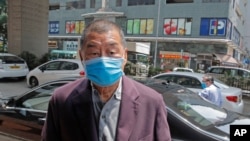Hong Kong’s political crackdown continued Friday as Jimmy Lai, media tycoon and founder of pro-democracy newspaper Apple Daily, was charged under the new national security law for “foreign collusion.”
“After an in-depth investigation by National Security Department of Hong Kong Police, a 73-year-old man was charged with an additional offense of ‘Collusion with a foreign country or with external elements to endanger national security,’” a police statement read. Lai is due to appear in West Kowloon Magistrates Court Saturday morning.
Lai was first arrested under the national security law on suspicion of foreign collusion in August, but after 40 hours in custody, he was released on bail.
Lai was arrested again December 2 for a separate offense – not under the national security law - this time over alleged fraud. He has been in custody since being denied bail. Lai is appealing this decision.
Friday’s new charges are likely to shatter his chances of being granted a successful appeal, as the national security law allows authorities to hold defendants without bail.
Hong Kong dissident Nathan Law, now in self-exile in the United Kingdom following the implementation of the law, called Lai’s case “extremely outrageous.”
“Jimmy is definitely targeted because he has been an important figure for the democratic movement. I believe the charges are targeting his speeches in the media,” Law told VOA.
Avery Ng, chairman of the League of Democrats in Hong Kong, said Lai is a “top priority on the Chinese Communist Party’s to-lockup list.”
“The government is just trying to keep finding excuses to lock up Jimmy for as long as they can. Remember, Jimmy will be spending months in prison without a single conviction,” Ng told Voice of America.
“The true meaning of ‘further investigation’ is ‘tailor-made persecution,’” Ng added.
Lai spoke out in June, hours before the new security law came into effect, saying that those within the pro-democracy movement will have to “stand firm” in the face of Beijing’s political crackdown.
“This national security law has done great damage to the whole democratic movement. Definitely, we will become a smaller group. However small we are, we have to stand firm and be prepared to go to prison, in turns. We have to keep the backbone of the democratic movement, this is our aim,” Lai said.
In more breaking news in the city, Hong Kong teenage activist Tony Chung was found guilty Friday on two charges of unlawful assembly and desecrating China’s national flag.
The conviction comes only a week after prominent pro-democracy activists Joshua Wong, Agnes Chow and Ivan Lam were sentenced to jail as pro-Beijing authorities target dissidents within the city.
Tony Chung, 19, is the former convenor of local pro-democracy activist group Studentlocalism. He was convicted for throwing China’s national flag to the ground and unlawful assembly during a protest outside Hong Kong’s Legislative Council in May 2019. Chung had pleaded not guilty to the charges.
However, Magistrate Peony Wong who was ruling over Chung’s case at Eastern Magistrates Court said Chung was throwing the Chinese flag “in an open manner” adding “the defendant walked back and jumped to throw the flag which made more people able to see what he did.
“The defendant had deliberately desecrated the flag,” the magistrate added.
Throughout the court proceedings, Chung appeared fairly relaxed, often glancing over his supporters in a packed out courtroom. As the judge announced the verdict, Chung was escorted from the dock. He then turned to his supporters in the public seating area and shouted: “HongKongers, hang in there!”
Chung spoke to Voice of America in October about his pending charges and admitted his lawyer had told him he was “likely to face jail,” even if he pleaded guilty.
Unlawful assembly and desecrating the national flag are punishable with a maximum sentence of three years in prison. Chung will be sentenced December 29.
Chung made headlines in July, as he was the first political figure to be arrested for violating the national security law on suspicion of secession. He was released on bail without being charged.
On October 27, though, the Hong Kong police national security unit arrested Chung after he allegedly tried to seek asylum at the U.S Consulate. He was later charged under the national security law on four charges including secession, money laundering and conspiracy to publish seditious material. He has been in custody on those charges since, with a court hearing set for January.
“I am more concerned about the National Security Law because it is not the same as the common law in Hong Kong, it is closer to the [Mainland] Chinese law,” Chung said in October.
Joseph Cheng, political analyst and former professor at the City University of Hong Kong, said the national security saw is an “instrument of suppression.”
“Police now tend to make arrests first, then engage in further investigations to introduce more serious charges. These arrests usually mean detention without bail,” Cheng said.




